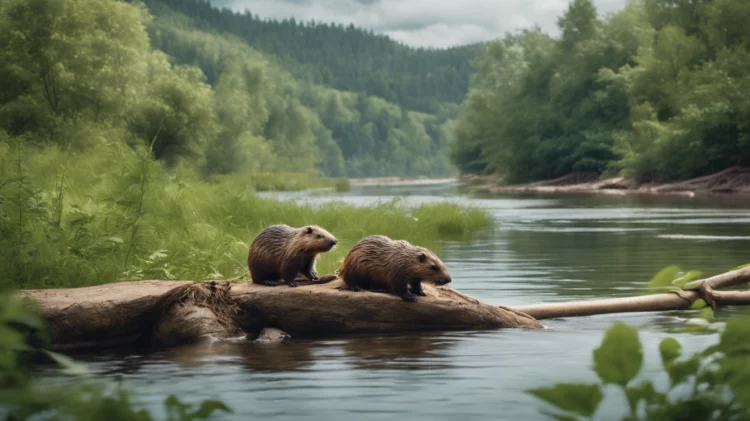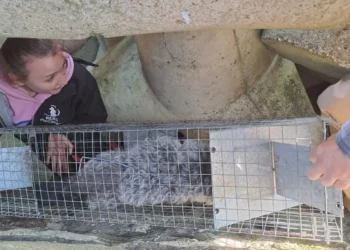In an impassioned plea, Gerhard Schwab, an ecologist known as the “Pablo Escobar of beavers,” has urged Poland’s Donald Tusk to reconsider plans to manage the beaver population through culling. Schwab, a self-proclaimed “good guy” despite his unusual nickname, argues that beavers, whose dam-building activities are causing problems for Polish authorities, should not be shot in an effort to protect infrastructure, particularly dams.
Schwab’s plea to Tusk, the leader of Poland’s Civic Platform party, comes amid growing calls for action against beavers in the country. Many local officials argue that the rodents’ tendency to construct dams is threatening Poland’s existing flood management systems. With rivers and waterways blocked by beaver-built structures, water levels rise, potentially leading to severe flooding. This has prompted discussions about culling the beaver population to alleviate the risks.
The Beaver Controversy
Beavers, once nearly extinct in Europe, have made a remarkable comeback in recent decades, largely due to conservation efforts aimed at protecting wildlife. While their return has been hailed as an environmental success, it has also brought challenges. Beavers are known for their natural engineering, using sticks, logs, and mud to construct dams that block water flow in rivers and streams. While these structures create ideal habitats for the animals, they also pose threats to human infrastructure.
In Poland, beaver dams are causing issues with flood control. Their constructions can obstruct waterways, leading to water accumulation behind the dams, which increases the risk of flooding. Local governments and wildlife managers are now faced with the dilemma of how to balance protecting human settlements and infrastructure with the welfare of the animals.
Poland’s government, led by Prime Minister Mateusz Morawiecki, has been under pressure to find a solution. But Schwab, who has been managing wildlife for decades and is often called upon for his expertise in beaver-related matters, believes culling the animals is not the answer.
Schwab’s Appeal
Gerhard Schwab, whose beaver advocacy has earned him the nickname “Pablo Escobar of beavers” — a moniker that plays on his reputation as a powerful, albeit benign, influence in the world of wildlife management — argues for a more humane approach. Schwab contends that instead of shooting beavers, authorities should invest in non-lethal methods to manage the situation.
“I understand the concerns about infrastructure, but shooting beavers is not the solution,” Schwab said in a recent statement. “We should be looking at ways to coexist with these animals. There are plenty of alternatives that don’t involve killing.”
Schwab is a proponent of so-called “beaver deceivers,” a method that allows water to flow through beaver dams without destroying the animals’ homes. By installing pipes through the dam, water can bypass the blockage without harming the beavers or their habitat. Schwab believes this approach could be widely adopted in Poland and serve as a model for other countries facing similar issues.
Appeal to Donald Tusk
Schwab’s message is particularly directed at Donald Tusk, the leader of Poland’s opposition Civic Platform party. Tusk, who has previously held high-level positions in both Poland and the European Union, is seen as a potential future leader. Schwab is calling on him to take a stand for wildlife conservation and encourage more sustainable methods of managing the beaver population.
“I’m urging Mr. Tusk to take a stance on this issue. Poland doesn’t need to declare war on beavers. There are better ways to protect infrastructure without harming these animals,” Schwab said.
He also added that public sentiment in many parts of Europe is increasingly opposed to killing animals, especially when humane alternatives exist. Schwab believes that promoting non-lethal solutions could help Tusk and other Polish leaders gain support from environmentally conscious voters.
Beavers’ Role in Ecosystems
Beavers play an essential role in ecosystems. Their dams help create wetlands, which are crucial for biodiversity. These wetlands support numerous species of plants and animals, provide natural water filtration, and help regulate water flow during times of drought and heavy rain. Removing beavers from the environment can disrupt these delicate ecosystems, which is why Schwab and other conservationists argue for their protection.
However, in Poland, beavers are often seen as pests rather than protectors of biodiversity. With their population growing and their dam-building activities becoming more common, the debate over how to handle them has escalated.
A Delicate Balance
The tension between human infrastructure needs and wildlife conservation is not unique to Poland. Across Europe, countries are grappling with how to manage beaver populations, which have rebounded significantly after centuries of decline. While their return has been celebrated by environmentalists, it has created practical challenges for local governments.
Schwab’s call for a reconsideration of Poland’s approach to beavers highlights the need for a balanced strategy — one that protects both people and animals. As Poland continues to debate the future of its beaver population, Schwab’s voice serves as a reminder that even the most problematic animals can have a place in modern landscapes if managed thoughtfully.


















